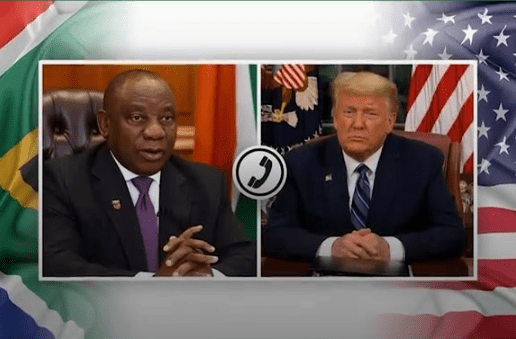President Cyril Ramaphosa’s upcoming engagement with United States President Donald Trump presents an important opportunity to dispel widespread misinformation regarding the state of affairs in South Africa, according to Democratic Alliance (DA) leader John Steenhuisen.
Speaking to IOL during Ukrainian President Vladimir Zelensky’s official working visit to South Africa on Thursday, Steenhuisen emphasised the significance of the upcoming discussions between Ramaphosa and Trump. He remarked that it was a critical moment to correct misconceptions held by some individuals.
“There’s no mass expropriation of land. There’s no genocide taking place at all. I am very glad that the two presidents have spoken,”
Steenhuisen said.
Concerns arose after reports surfaced that elements within the United States administration had been misled by South African lobby groups. Organisations such as AfriForum and the Solidarity Movement allegedly provided inaccurate information to President Trump’s government, suggesting that white South Africans were systematically targeted by state policies. These claims, according to the South African government, are both erroneous and dangerously misleading.
The government responded strongly, rejecting the accusations outright. Officials described the allegations as a distortion of reality, asserting that they serve no constructive purpose in fostering international relations. President Trump’s reaction to these claims had a tangible impact: he announced a 30% tariff increase on South African goods and halted certain aid programmes to the country.
Additionally, Trump extended an offer of refugee status to Afrikaners, citing concerns over supposed land expropriation without compensation and racial discrimination. However, this offer was declined by AfriForum, with the organisation asserting that its members could not afford to abandon their homeland.
Steenhuisen, who also serves as Minister of Agriculture, appealed to citizens to approach the next few months with caution. He stated,
“We must use the next 90-day period very wisely and very cleverly”
to avert the potential negative impact of the newly imposed tariffs.
Against this backdrop, President Ramaphosa confirmed that he and President Trump had agreed to meet in the near future to address these growing tensions. Ramaphosa shared details of their discussion, noting,
“We both agreed to meet soon to address various matters regarding US-South Africa relations. We also spoke about the need to foster good relations between our two countries.”
Trump’s remarks about “terrible things” supposedly happening in South Africa have stirred significant debate both domestically and abroad. Steenhuisen stressed that the forthcoming meeting would be crucial in demonstrating the real situation in the country, far removed from the alarmist narratives being circulated.
By correcting these false narratives directly with the United States President, South African leaders hope to rebuild trust and strengthen bilateral relations. Given the economic and diplomatic stakes involved, many observers see this dialogue as not merely beneficial but essential.
there is a noticeable shift here. John Steenhuisen’s remarks seem to distance the Democratic Alliance (DA) from the narrative propagated by organisations like AfriForum, which had long pushed claims about widespread land seizures and violence against white South Africans. For a significant time, critics accused the DA of either quietly endorsing or failing to strongly challenge this messaging — perhaps wary of alienating parts of its voter base.
Now, Steenhuisen’s direct refutation — saying, in no uncertain terms,
“There’s no mass expropriation of land. There’s no genocide taking place at all.”
— marks a clear departure. It reflects a more statesmanlike approach, one seemingly focused on protecting South Africa’s international standing rather than playing into fear-driven narratives.
This shift could be influenced by several factors: the economic risks of US tariffs, South Africa’s need for international goodwill, and the political realisation that association with such claims damages the DA’s credibility both domestically and abroad.
It also raises some questions:
Why did the DA not take this stance sooner, especially when the misinformation started gaining traction?
Is this position a genuine change in policy, or is it a tactical move triggered by mounting diplomatic and economic pressure?
Thanks to IOL for the original reporting that informed this article.

















